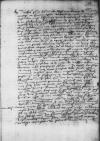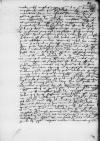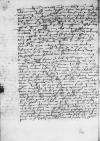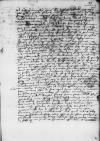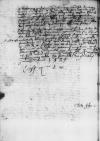List #2256
Felix REICH do Ioannes DANTISCUSFrauenburg (Frombork), 1538-12-28
| odebrano [1538]-12-30 Rękopiśmienne podstawy źródłowe:
| ||||||
Tekst + aparat krytyczny + komentarz Zwykły tekst Tekst + komentarz Tekst + aparat krytyczny
R[everendissimo] ... d... et ...
Reverendissime in Christo Pater ac Domine mi clementissime.
Cum videam Reverendissimam Dominationem Vestram tantopere et sincero affectu valetudinis meae curam gerere, rependat eius benevolentiae vices Deus. Aliquid ulterius de ea scribendum duxi. Hesterno die, quae fuit vigilia Natalis Domini nostri Iesu Christi, interclusis vitalibus spiritibus videbar iam iam exhalaturus aad nimam, sed rogavi Dominum diligenter, ut saltem in posterum nativitatis suae diem me misericorditer servare dignaretur, ut viatico salutari munitus tanto maiori fiducia in communione fidelium et caelesti favore hinc migrare possem. Exaudivit mox vota mea Dominus et apertis spirituum meatibus respirare me permisit, adiciens desideratum a me diem. Adiecturus forte aliquot alios, sed ob letalem morbum et hominibus incurabilem vita mea diuturna esse nequit, nisi divinae miserationis virtute, praesertim absumpta iam prope carne et vitalibus humoribus exhaustis.
Iam aliquomodo Dominationem Vestram Reverendissimam hoc iniucundo argumento non molestabo, saltem ea, quae saepenumero fortassis iam inculcavi, Dominatio Vestra Reverendissima boni consulat, et de mittenda cervisia triticea. De cetero nihil prorsus sit sollicita.
In causa confratris et amici mei, cuius vices profecto doleo, facile esset invenire consilium, quo citra magnum negotium decidi posset, si mihi suppeterent vires, praesertim capitis. Obversantur mihi praeterea animo me tam vivum, quam mortuum, in non parva pericula coniciendum, ubi res non satis tuto et caute ac secretssima fide tractata fuerit.
Proinde summopere curandum erit, ne minima iota harum rerum, si quas scribere mihi concesserit Dominus, prodeat, aut litterae vel nuntius Reverendissimae Dominationis Vestrae aperte ad me mittantur. Mox alioqui suspiciones emergunt innumerae, etiam in insontem. Quapropter titulum litterarum ad me Reverendissima Dominatio Vestra domino
Haec salutis nostrae die prima scripsi. Plura, si dederit Dominus, cras subiciam. Iam me prope modum capitis vertigo occupat, ut plura nunc nequeam.
Quod ad dominum
Ut autem in tempore his malis obviam eatur, salvo Reverendissimae Dominationis Vestrae iudicio, ita procedendum reor, quod eadem Reverendissima Dominatio Vestra hominem secundo clausis ac paternis litteris admoneat, superioribus tamen paulo severioribs ac brevissimis, ut eam litteris suis certiorem quam primum, hoc est circiter Kalendas Ianuarii, certiorem reddat, an iuxta promissa suam mulierculam cum prolibus ex aedibus suis amoverit, imo ut ei persuadeat, ut se in alium quempiam locum conferat ac domicilium Frawenburgense commutet, ne qua, vel minima, pristini congressus suspicio remanere possit. Unum furtivum aut nocturnum congressum si deprehendatur, ut raro fallit maiorem spargere infamiam, quam fortassis multorum mensium consuetam ac celatam cohabitationem. Cum admonitione futuri scandali si hic manserit, ut superius dixi, non enim diutius tolerare Reverendissima Dominatio Vestra aut se continere posset, quin contra alios quoque quamprimum sit processura et tam infame scandalum tandem aliquando amolitura, propter quod duorum aut trium culpa et Reverendissimam Dominationem Vestram, et totum ecclesiae collegium non solum hic in
Quod si mulier hinc abire noluerit, facta
Sed habet, ut audio, litteras divortii, quas exhibebit, mulier. Verum tamen nihil hoc curet Reverendissima Dominatio Vestra (quod in secretissimam aurem dico) nec opus fore puto, ut iudicis sententia (quod molestum esse solet) rescindatur, sed relinquatur, ut valeat, quantum possit. Non enim talis separatio perpetua esse solet. Nihilominus nolle aliquomodo Dominationem Vestram Reverendissimam tolerare, ut eius apud ecclesiam praesentia tantam nobis infamiam irroget, ut supradictum est.
Palam esse eam habere viventem maritum, cui et humano, et divino iure adhaerere teneatur, utcumque ad tempus sit divortiata. Publicum praetera existere, quod in publico adulterio ex aliis maritis intra tempus divortii progenerit aliquot proles, quod non modo censura ecclesiastica, sed humanis legibus sit puniendum. Ad quod nihil suffragatur quaecumque divortii sententia etc.
Quonam pacto ad ulteriores censuras, hoc est excommunicationem, aggravationem, reaggravationem etc. procedendum sit, hinc semper id exigo cum nec necessitas postulet, nec ego vires habeo, qui tantis sufficiant laboribus, qui haec ipsa revera non sine morbi mei augmento tam prolixe scribo, libenter etiam usque ad mortem Dominationi Vestrae Reverendissimae inserviens. Sed cum in hac una causa deinceps minime sit opus mea opera, non possum mihi persuadere Dominationem Vestram Reverendissimam me aliquomodo hac in re frustra et profecto sine causa oneraturam. Habet dominum
Verum tamen, si postea cum aliis aliqua perplexitas inciderit et dominus
Dominus
In his transactionibus talis processus observari solet, ut possessor renuntiaturus suo beneficio procuratores in
Esto, vita contingat satis longa, quo iure aut qua ratione
Sed quid, rebus omnibus iam - proh dolor - confectis, actum ago et frustra prolixius scribendo me crucio? Ut videlicet aestum curarum mearum in sinum Reverendissimae Domintionis Vestrae sinceriter effunderem et et maerorem cordis communione calamitatis nonnihil lenirem. Certum enim habeo Dominationi Vestrae Reverendissimae tam iucunda, quam tristia mea curae et paternae sollicitudini existere. Proinde minus eam aegre laturam, ubi quid morbi impatientia suggerente et ipsius facti indignitate permovente imprudenter aut parum continenter effuttierim. Quae solet boni consulere omnia, quae iniquo animo non fiant.
Postremo, ut aliquando tandem ineptias meas finiam. Audio dominum Valentinum Duschke camerarium extremum vitae suae tempus Deo dedicare et absolutum a curiarum strepitu et negotii[s] aulicis illi debitum pensum solvere constituisse, si modo cum gratioso favore Reverendissimae Dominationis Vestrae dimitti posset. Quapropter eandem Reverendissimam Dominationem Vestram supplex oro, ut id (quia aequum videtur) etiam mea intercedente petitione impetrare et obtinere possit.
Commendo me devotissime Reverendissimae Dominationi Vestrae. Cui quid aliud, quam numinis caelestis favorem et gratiam imprecor, non video.
Ex
Eiusdem Reverendissimae Dominationis Vestrae totus
